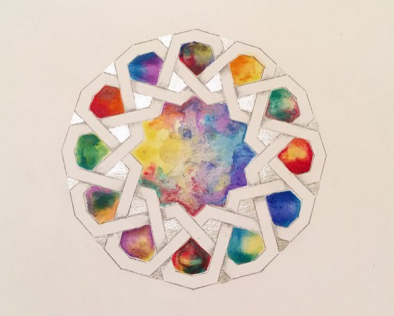The world is now referred to as a Global Village.
Consumerism, materialism and mass consumption are the norm. In the short period from our parents’ youth to ours, consumerism has entered every aspect of lives. It has its benefits- it comes with great convenience, helping us to cope with the pressures of working life – saving us precious time to work longer hours to pay for things we probably don’t need. It’s also extremely satisfying, gratifying even, to ‘click to order’ whatever we desire, having it arrive moments later.
Convenience is a great way of life although it poses problems when we can no longer differentiate between what we ‘need’ and what we ‘want’. We are now completely disconnected from our belongings, our food, and our ‘things’. With every item we purchase, order and acquire, we fail to consider that a long line of production went into its creation. How our ‘things’ are made is out of sight and out of mind.
As Muslims, it is our religious duty to assess if our ‘things’ are created in an ethical manner and judge the best way to use our money. Unfortunately this sentiment has completely left us as believers. Muslims all around the world have embraced consumerism – and often are making the worst choices- preferring cheap discounted prices over ethical products and quality standards.
It is testing and difficult to hold oneself to account in a society which prides itself upon material gain and displaying our affluence as we snap our every possession for an instantaneous buzz of self-gratification. But with the light of Islam as our moral compass I believe Muslims can find a healthy balance in today’s world.
Allah say’s to us:
“And it is He (God) who has made you successors (khala’ifa) upon the earth and has raised some of you above others in degrees [of rank] that He may try you through what He has given you. Indeed, your Lord is swift in penalty; but indeed, He is Forgiving and Merciful.” (Qur’an 6:165).
Allah has placed human beings as khala’ifa upon the Earth – a word of which carries multiple meanings. The definition of khala’ifa means deputy, guardian, a ‘friend of Earth’ – a steward. With such a title comes great social, environmental and economic responsibility. We will be questioned on our reasoning and decision making in all these areas.
Mindfulness in our consumption
The Prophet Muhammad (peace be upon him) advised us to consume only what is necessary, considering natural environments and avoiding waste, even if resources are plentiful. He was a man who would repair his own shoes and sew his clothes –sometimes not due to poverty but to minimise wastage. When the Prophet received a new piece of clothing he would give thanks to Allah, acknowledging the value and blessing of each and every possession in his hand.
In Islamic tradition, quality is preferred over quantity. There is no problem purchasing but buying only that which is of good quality and produced in a just and fair manner will bring blessing into your life. It is better that you provided someone with a dignified livelihood rather than contributed to a situation of injustice in the lifespan of your belongings.
Animal Welfare
“Eat and drink from the provision of Allah, and do not commit abuse on the earth, spreading corruption (Qur’an 2:60)”
This ayah is chilling when we consider the condition of the halal meat industry today. Animal welfare groups call for the banning of halal [and kosher] methods due to the poor conditions of slaughterhouses and the abuse of livestock. Many controversial news segments have exposed such brutalities within the halal meat industry, calling into question whether our chicken meets the true requirements of halal. Battery farmed chickens are fed growth hormones and kept alive through anti biotics due to unsanitary conditions, they often stand and eat their own faeces. They never see daylight and are raised isolated indoors. In the worst cases they are mutilated, their beaks are cut off to avoid them pecking at each other due to distress. How can a battery farmed chicken be classed as halal simply through the recital of Allah’s name? Did Allah not tell us to eat from that which is halal and tayib (good)?
These abuses are not necessary because of the halal method but rather they are used to enable farms to meet our demand to eat chicken and meat. The guidelines of halal are intended to allow the animal to live a pleasant life and to be slaughtered in the most merciful way, teaching us humility in turn.
But is there any humility in consuming meat every single day – twice a day?
In the time of Umar Ibn Al Khattab (May Allah be pleased with him) when the Muslim lands were expanding and wealth was entering the community, he banned consuming meat every day, calling it addictive. The Prophet (peace be upon him) never ate beef and the prophetic diet discourages eating meat more than once a week to reduce health risks such as gout.
While it may seem like the situation is out of our control, there is a lot that our community can do to combat the un-Islamic practices of the meat industry. For a start we need to stop accepting low quality for low prices and tame our greed for meat and chicken, reducing how much we eat. We can no longer turn our cheek in blissful ignorance when every so often new scandals are uncovered by the media on how halal meat has been served that wasn’t actually halal.
As consumers, our choices are keeping this industry alive – literally. If we demand better standards of meat and are prepared to pay fairer and higher prices, our butchers would be pressured to supply free range and organic options. Recently in my local area our butcher has sourced free range chickens raised on non-GMO feed due to growing demand and persistence from the community. Do not underestimate the power of organizing.
Support Fairtrade produce and local businesses
‘Give full measure and full weight in justice, and wrong not people in respect of their goods.’ (Qur’an 11:85)
Islam is not just a religion of peace, but a religion of justice. The Prophet (peace be upon him) was a tradesman himself and was given the title ‘the Trustworthy’. 1400 years ago Islam supported the ideals of what we now call Fairtrade: sustainability, fairness, and workers’ rights. In today’s capitalist world, most of the produce from supermarkets and big brand names are a product of exploitation from developing countries. To deliver competitive low pricing to us in the West, big brand names are undercutting workers abroad by providing low pay, poor working conditions and no workers’ rights.
The exploitation of workers abroad is something we cannot ignore.
The Quran say’s,
‘God loves those who are fair and just.’ (Qur’an 49:9)
These characteristics also extend to how and where we choose to spend the wealth that Allah has blessed us with. One way in which we can adhere to this is to support local businesses to circulate wealth in the local community and provide sustenance for our neighbours. Communities all over the country are organizing to make this as easier with locally run awareness campaigns to clearly outline where to buy local groceries from.
Local businesses sustain the local economy by providing local jobs and are often far more ethical in the running of their businesses compared to faceless supermarkets. Umar Ibn Al Khattab (May Allah be pleased with him) was ferociously against monopolizing markets – today our high streets have been taken over by supermarket chains and local shops have been forced to shut down as they cannot profitably compete with low pricing. This has led to local industry dying out all over the country and pushing traditional families into poverty.
Islam is a holistic religion that encompasses every aspect of our lives. The beauty of our faith is that it guides us to back to the seeratul mustakeem rerouting us in times of confusion. Through our history Muslims have succeeded when they were able to renew their Islamic ethos and extend it to all their dealings.
Our consumer choices have a great impact locally and globally. It’s time we show appreciation for the prosperity Allah has blessed us with and make well informed decisions on where we spend our wealth. By following the guidance of the Quran and the prophetic example, Muslims can make a positive impact on global markets demanding fairer business and justice (for workers and animals).






One thought on “Living Islam In A Globalized World”
Mashallah, Nice work.
I checked you have nice work. I have website http://www.wikifandom.com.
Can you work with me.